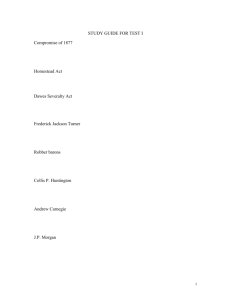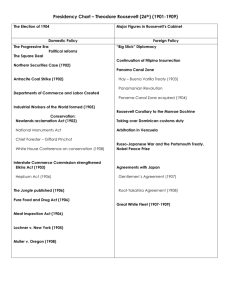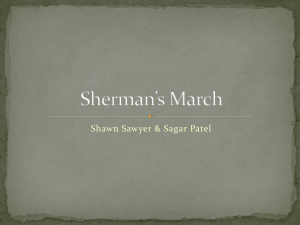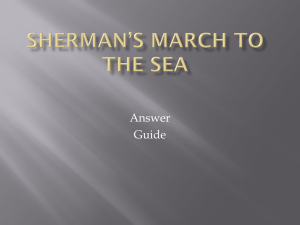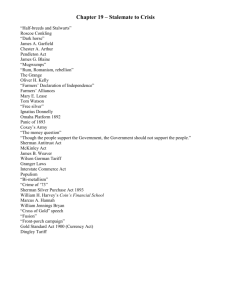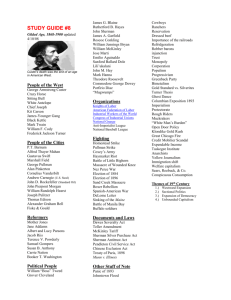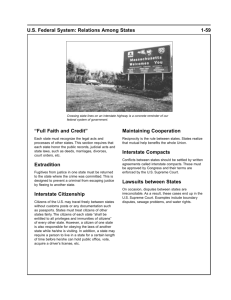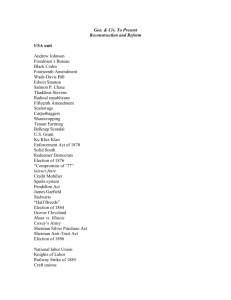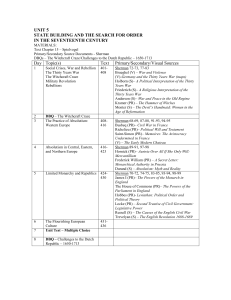TR and the Modern Presidency
advertisement
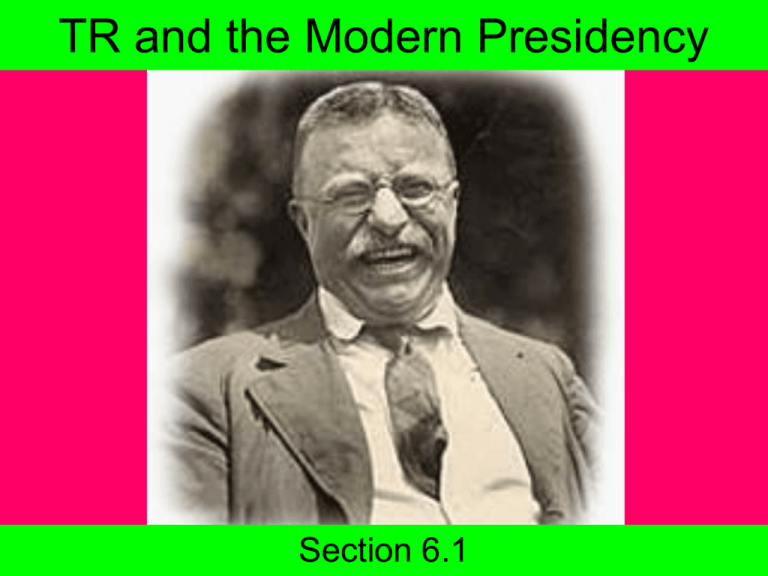
TR and the Modern Presidency Section 6.1 Do Now: • Smart Board Activity: How is this quote indicative of T.R. as a progressive and a president? "It is not the critic who counts: not the man who points out how the strong man stumbles or where the doer of deeds could have done better. The credit belongs to the man who is actually in the arena, whose face is marred by dust and sweat and blood, who strives valiantly, who errs and comes up short again and again, because there is no effort without error or shortcoming, but who knows the great enthusiasms, the great devotions, who spends himself for a worthy cause; who, at the best, knows, in the end, the triumph of high achievement, and who, at the worst, if he fails, at least he fails while daring greatly, so that his place shall never be with those cold and timid souls who knew neither victory nor defeat." Today we will be able to identify those actions that T.R. took that made him a truly modern and progressive president by examining his beliefs about conservation, his actions during the Northern Securities Case, his action during the strikes he faced, and his reaction to The Jungle. Conservationist vs. Preservationist • Concerned about wasteful use of resources • Gifford Pinchot (Chief Forester) proposed planned management (conservationist) of resources • John Muir of Sierra Club proposed preservation • TR took a pragmatic approach Sherman Anti-Trust Act Text Sherman Antitrust Act, 1890, first measure passed by the U.S. Congress to prohibit trusts; it was named for Senator John Sherman. Prior to its enactment, various states had passed similar laws, but they were limited to intrastate businesses. Finally opposition to the concentration of economic power in large corporations and in combinations of business concerns led Congress to pass the Sherman Act. The act, based on the constitutional power of Congress to regulate interstate commerce, declared illegal every contract, combination (in the form of trust or otherwise), or conspiracy in restraint of interstate and foreign trade. A fine of $5,000 and imprisonment for one year were set as the maximum penalties for violating the act. Northern Securities v. United States (1902). • Holding company owned by JP Morgan • Controlled RR rates (1902) • TR ordered Justice Department to use Sherman Antitrust Act against RR monopoly in Northwest • Supreme Court ruled (1904) that it must be dissolved • Gave TR label of a trust buster Describe TR’s actions during the Anthracite Coal Strike of 1902 • 1902 140, 000 coal miners went on strike • Goal of United Mine Workers – 8 hr. work day – 20% pay raise – Union recognition • Company refused any negotiation • TR threatens to nationalize the coal mine • Outcome – 9 hr. work day – 10% pay raise – No Union recognition TR Regulate business? • Department of Commerce and Labor (1903) • Created to regulate business and enforce economic regulations How did TR strengthen the Interstate Commerce Act? • Elkins Act of 1903 – Amended ICA of 1887 – Forbade rebates, defined unfair discrimination and reinforced adherence to publish rates by interstate shippers • Hepburn Act of 1906 – Gave ICA authority to determine RR rates and prescribe bookkeeping methods – Prohibited free passes and forbade rr companies to carry goods produced by themselves Upton Sinclair and The Jungle How did TR attempt to protect the consumer? • Meat Inspection Act • Pure Food and Drug Act of 1906 of 1906 – Forbade – Authorized manufacture, sale Secretary of adulterated foods Agriculture to and drugs and the inspect all meat mislabeling of products for human products consumption – Caused by public outcry from The Jungle by Upton Sinclair Judging Roosevelt President William Howard Taft P27wht.wmf •Hand picked by Roosevelt Avid "trust buster" •Had a falling out with TR over conservation •Sided with “Old Guard” Republicans
